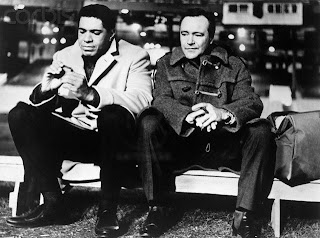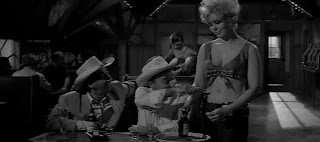Those words kickstarted Tom Powers on his lethal climb to becoming a big city menace. He was The Public Enemy as famously played by James Cagney in a tough 1931 film directed by William Wellman. The Christmas present that the young man and his best friend each get is a gun. Tom Powers was a juvenile delinquent, a dark Oliver Twist who spent much of his formative years with a Fagin-like hood called Putty Nose. He's recruited boys into a life of crime. They become bad men.
James Cagney was born with star quality. Coupled with his fine acting and dancing skills, movie stardom was in his destiny. He shot to Hollywood fame as the cold-blooded Chicago gangster. When I was in grade school, this Warner Bros. movie aired frequently on local Channel 9 in Los Angeles. Cagney fascinated me. Film school students today could learn a thing or two from the style of director William Wellman. The Public Enemy is under 90 minutes long. I hadn't seen it in quite a while and watched it over the weekend. Wow. Cagney's magnetism and style of acting still hold up. It's really more being than acting. It's honest, direct, intelligent and witty. He listens. He reacts. He brings you into the heart and soul of a character whether that heart and soul are dark or light.
In The Public Enemy, he's bold enough to be unlikable. He doesn't try to get your sympathy because Tom grew up on the wrong side of the tracks. You, the viewer, can do that work on your own. Wellman shows you that childhood can be the blueprint for the rest of your life. As a youngster, Tom Powers is a tough minor. He drinks beer. He has no regard or respect for authority. He has no respect for females. He doesn't care about education. He wants big money. He's society's perfect candidate for a life of crime. He grows up to become such a cold-blooded gangster that killing, for him, is just as easy as a short order cook making a hamburger in a diner. He's emotionally detached from the evil of it. He can pump a couple of bullets into a former friend point blank and then, a few seconds later, wonder what his new babe is up to and head over to pay her a booty call.
Cagney was so at ease on camera. He instinctively knew the power of thinking -- and how the camera could pick that up. There's an unforced sexuality and swagger in his performance that were new to film. Keep in mind, the crime story came out just a few years after movies learned how to talk with The Jazz Singer in 1927. Cagney has scenes with another performer who'll also shoot up to fame. But not for this role. Jean Harlow was still in her sophisticated vamp stage. She's a hot looking platinum blonde and she, too, has star quality but movies still didn't quite know what to do with her.
Harlow's seductress is shackled with some clunky dramatic dialogue like "...you're so strong. You don't give, you take. Oh, Tommy, I could love you to death."
That was for Warner Bros. When MGM signs her and let's her play wisecracking tootsies with a heart of gold, Jean Harlow's true talents are free to soar in hits like Red Dust, Bombshell and Dinner at Eight. Comedy kicks the blonde sex symbol up to screen icon.
One wishes she could've teamed up again later with Cagney -- who'd also prove that he could handle comedy and some fast-paced wisecracks himself. When I wrote that today's film students could learn a thing or two from Wellman's directorial style, one prime example is the shoot-out with Schemer's gang. It has a Wellman signature -- not showing something and letting the viewer's imagination do the work. One night, in the pouring rain, a rival gangster heads into a building with his men. Tom Powers, armed, has been waiting for them. He charges into the building. The windows are blocked. We can't see a thing but we hear a shower of gunfire and the piercing screams of a man in agony. Tom Powers staggers back out into the rain, alone on the street and seriously wounded. Before he collapses from his wounds, he says "I ain't so tough."
The attention remains on Cagney -- on his ballsy solo deed and and his dance of pain afterwards as he staggers out. DePalma or Tarantino would've shown the graphic carnage. What Wellman did is much more effective, economical and creative. And is serves the new-star, James Cagney. What an extraordinary talent he was. His work in The Public Enemy, Angels with Dirty Faces, The Roaring Twenties and White Heat are some of the best performances of hoodlums given by any Hollywood actor to this day. And James Cagney won his Best Actor Academy Award for one of Hollywood's most heart-warming, patriotic musicals that's also a biopic.
He's marvelous as Broadway song-and-dance showman and songwriter George M. Cohan in 1942's Yankee Doodle Dandy, a gem in the Warner Bros. musical crown.
Cagney sang and danced, made you laugh and put a tear in your eye with his poignancy.
The Broadway legend made one major movie. Sixty years before we laughed at Kevin Kline as Dave, George M. Cohan played a performer who looked exactly like the Commander in Chief. Cohan starred in Paramount's 1932 musical comedy, The Phantom President, with Claudette Colbert and Jimmy Durante.
Cagney. As I wrote up top, his magnetism and style of acting still hold up.


























































